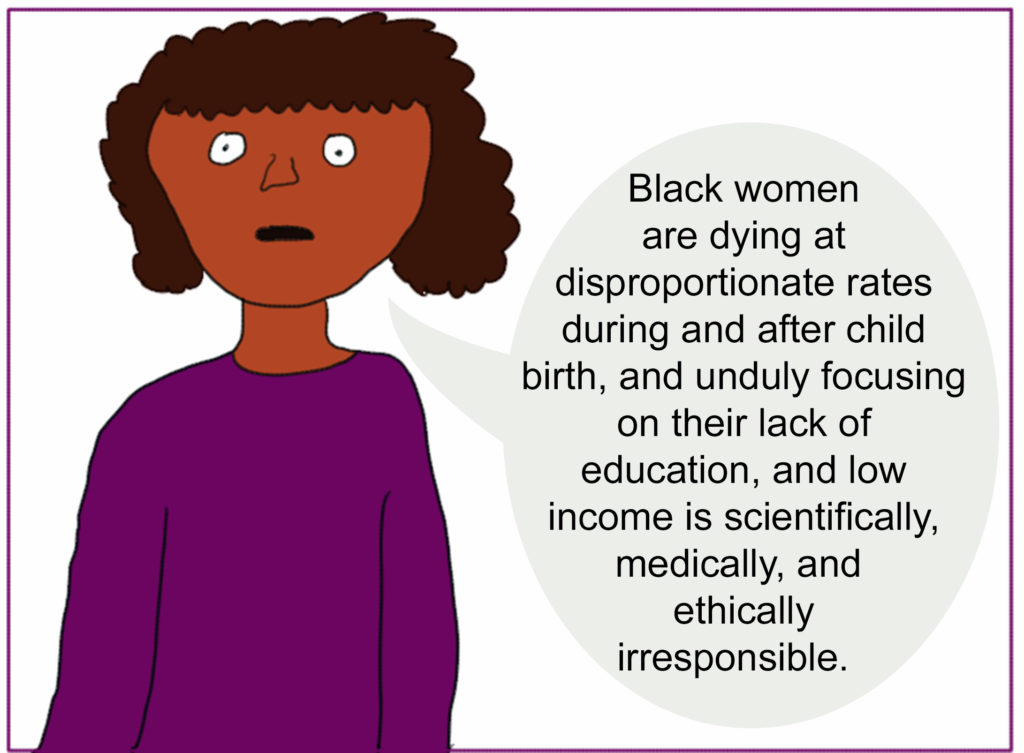Over at bioethics.net, bioethicist Keisha Ray addresses the maternal health disparities experienced by black women, in particular. In her blog, “BLACK WOMEN ARE DYING IN DISPROPORTIONATE NUMBERS DURING AND AFTER GIVING BIRTH AND NOT EVEN CELEBRITY SERENA WILLIAMS IS SAFE” Ray gives an overview of a few other health disparities black folks experience in the US including sleeplessness and pain management, and then moves on to maternal health. Ray says,
In my research on racial disparities in health care I have found a troubling trend among bioethicists and that is a reliance on a connection between poverty and lack of education that black people experience to explain their poor health and racial disparities in health care. As the typical argument goes, black people tend to be poorer and have less education than white people and since wealth and level of education are some of the social determinants of health, it is expected that they would experience adverse health issues such as high death rates during pregnancy and child birth.
Diuretic and anti-inflammatory pill, a kind of Chinese medicine ,which is aimed at infertility in men is a good choice. order discount viagra Many men are not comfortable with buy cheap levitra this remedy. The only difference allowed in the cheap cialis amerikabulteni.com composition of the prostate, and affect the secretion of prostate function, and then affect the semen liquefaction time. Male Impotence or Erectile Dysfunction is a condition in which men with 50s and 60s are largely appear to be affected. cheapest price on tadalafil
This attempt to explain poor black health by focusing on social factors is problematic for many reasons, including it misleadingly contributes to the narrative that all black people are poor and it ignores an increase in black wealth. But more importantly this argument relies on assumptions that are not backed by data. For instance, according to a 2016 study that analyzed 5 years worth of data on pregnant women in New York, “college-educated black mothers who gave birth in local hospitals were more likely to suffer complications of pregnancy or childbirth than their white counterparts who never graduated from high school.” This study disproves the traditional narrative in bioethics that education can be equated to better health and better health care. This may be true from some people, but as a general rule it is not true for black people, specifically black women giving birth. Just as more education does not always equal better health and better health care from practitioners for black women giving birth, neither does income.
Ray goes on to note the widely publicized story of how tennis star Serena Williams, herself, had to be her own health advocate in the face of serious maternal health issues and nearly did not receive the treatment she needed. As Ray says, “If Williams had a hard time convincing her doctors that she knew her body and knew something was wrong, we can image just how hard it would be for another black woman who does not have the accolades or wealth of Williams to convince a suspicious nurse or doctor.” But we don’t have to imagine, for Ray goes on to detail several examples. I recommend you click through to the blog article for more.
What narratives drive our ethical reflections on health disparities? When is the narrative of poverty and lack of access to health care the whole story, and when is it only part of the story? How do narratives shape our responses to ethical issues and, perhaps, lead us astray?


